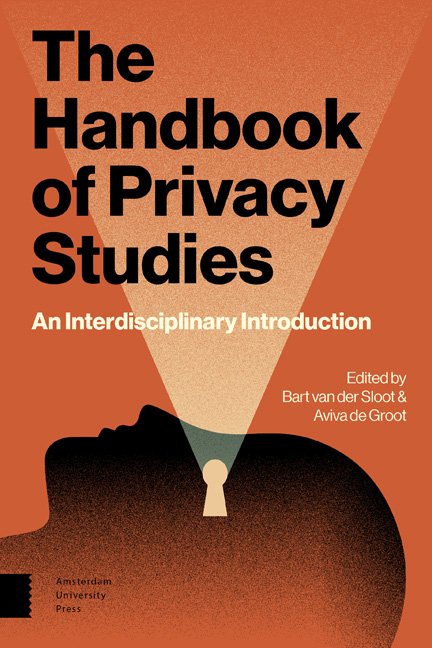Book contents
- Frontmatter
- Contents
- Introduction
- 1 Privacy from a Historical Perspective
- Legislating Privacy: Technology, Social Values, and Public Policy
- 2 Privacy from a Legal Perspective
- Three Dimensions of Privacy
- 3 Privacy from an Ethical Perspective
- Nudging: A Very Short Guide
- 4 Privacy from an Economic Perspective
- Security, Privacy, and the Internet of Things (IoT)
- 5 Privacy from an Informatics Perspective
- Political Science and Privacy
- 6 Privacy from an Intelligence Perspective
- A Privacy Doctrine for the Cyber Age
- 7 Privacy from an Archival Perspective
- Medical Privacy: Where Deontology and Consequentialism Meet
- 8 Privacy from a Medical Perspective
- Privacy Law – on the Books and on the Ground
- 9 Privacy from a Media Studies Perspective
- Diversity and Accountability in Data-Rich Markets
- 10 Privacy from a Communication Science Perspective
- Still Uneasy: a Life with Privacy
- 11 Privacy from an Anthropological Perspective
- About the Authors
7 - Privacy from an Archival Perspective
- Frontmatter
- Contents
- Introduction
- 1 Privacy from a Historical Perspective
- Legislating Privacy: Technology, Social Values, and Public Policy
- 2 Privacy from a Legal Perspective
- Three Dimensions of Privacy
- 3 Privacy from an Ethical Perspective
- Nudging: A Very Short Guide
- 4 Privacy from an Economic Perspective
- Security, Privacy, and the Internet of Things (IoT)
- 5 Privacy from an Informatics Perspective
- Political Science and Privacy
- 6 Privacy from an Intelligence Perspective
- A Privacy Doctrine for the Cyber Age
- 7 Privacy from an Archival Perspective
- Medical Privacy: Where Deontology and Consequentialism Meet
- 8 Privacy from a Medical Perspective
- Privacy Law – on the Books and on the Ground
- 9 Privacy from a Media Studies Perspective
- Diversity and Accountability in Data-Rich Markets
- 10 Privacy from a Communication Science Perspective
- Still Uneasy: a Life with Privacy
- 11 Privacy from an Anthropological Perspective
- About the Authors
Summary
Introduction
Archival science is an academic and professional discipline. As such it is concerned with the theory and methodology, as well as the practice, of the creation, use and preservation of records and archives: coherent collections of records. Archives are kept for several reasons: democratic states feel the need to be transparent; archives can be used to make political accountability possible; archives are essential in assisting the protection of citizens’ rights, and they are necessary to answer a societal need for safeguarding collective memory and cultural heritage.
It is not uncommon to distinguish between records management and archives management. The former is concerned with records in general, yet more in particular with records that are relatively young and still used in their functional context. A fraction of those records will be selected for long-term preservation and transferred to a repository. This chapter will deal with the privacy aspects of long-term preservation. Information specialists that work in this field are generally called ‘archivists’. The term ‘archive’ is used both for an archival institution and for a collection of records.
Records, in the sense of pieces of evidence or information, might well contain personal data. Seeing that records will be collected and arranged, and can be accessed, altered, or deleted, it becomes clear that privacy and data protection issues must be taken into consideration.
Is there sufficient reason to discuss the privacy aspects of long-term preservation of information? Elena S. Danielson, author of the book The Ethical Archivist, summarizes it neatly: violation of privacy is part of the archival process. ‘The real question is how it can be meliorated.’ (Danielson 2010, 9) Much in this chapter will deal with this field of tension between long-term archiving of personal data and its objectives, and the protection of privacy and personal data.
Broadly speaking there are three ways in which information becomes eligible for long-term preservation. Firstly, there is government-generated information, which might be transferred, after a selection procedure, into a government-linked repository (archival institution). A birth certificate would follow this route. Secondly, a government-linked archival organization can acquire materials at will.
- Type
- Chapter
- Information
- Handbook of Privacy StudiesAn Interdisciplinary Introduction, pp. 299 - 326Publisher: Amsterdam University PressPrint publication year: 2018

